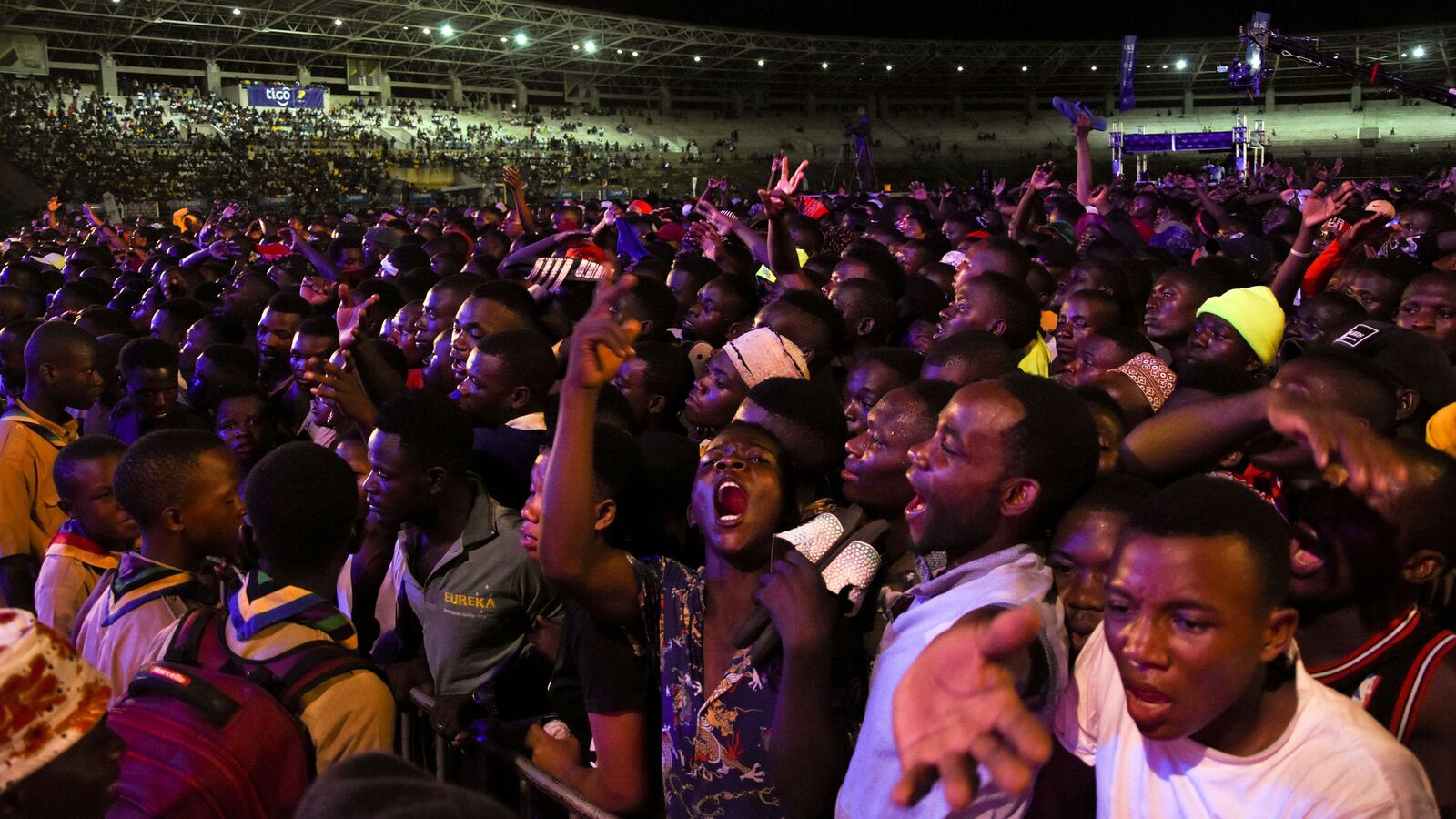ZANZIBAR, Tanzania—“I fully support lockdowns and COVID restrictions, I just choose not to follow any of them” said Simon, who knew he’d be fired if he allowed The Daily Beast to publish his real name, before finishing off a pint-sized plastic red cup filled with equal measures of vodka and coke. He was pre-drinking for Sauti Za Busaraa, a large Tanzanian festival headlined by some of East Africa’s biggest acts. “One person’s individual behavior is going to make no difference at all.”
The Zanzibar-based Brit, who is in his twenties, works as a consultant for a major European luxury fashion brand, but his employers think he is stuck under lockdown in his flashy central London apartment. Instead, he is Zooming into work from the Hilton Hotel just meters from the harbor of Zanzibar.
Set inside the stone walls of Zanzibar’s old colonial Arab Fort, the festival was a complete danger zone by the cautious standards of today’s world. Organizers claimed that at least 5,000 revelers crowded into the fortifications of the UNESCO Heritage sight for two days of ‘partying like it was 2019 again.’ As in all of Tanzania, of which Zanzibar is an autonomous region, there was barely a mask in sight. There are no restrictions on mingling, no curfew, and the scores of couples passionately making out on dance floors gives a clear indication of what revelers think of the social distancing concept.
In an old amphitheater to the side of the main stage, attendees in search of a quieter time openly smoked joints, sniffed cocaine, or poured copious amounts of local spirits, which were going for just a few dollars a bottle. It was the place to be for those after a taste of the freedom that COVID-19 has robbed from the rest of the world. Similar parties have taken place in other tropical spots around the world, including in Colombia and Mexico, but even these places have their restrictions. Tanzania has been the closest place to a true free-for-all.
Although Simon is the most honest about his brazen hypocrisy, he is far from alone in fleeing the lockdowns of the grey European winter for sandy beaches and sunshine. In two weeks of reporting from Tanzania, The Daily Beast encountered employees of major international organizations like Amazon, Citigroup and even the United Nations. The freedom to work remotely has led an enterprising, if ethically dubious set of well-paid office workers to set up their home offices thousands of miles away from their colleagues. Tanzania’s time zone, three hours past London time, allows them a few hours of extra sleep to ward off the hangovers before staggering to their computers for morning meetings.
Their main challenge has been to come up with ever more elaborate excuses for their constantly crashing internet and ever-improving tans. “I’m so worried about my tan!” Suzy, who also used a pseudonym, told The Daily Beast. Working for a major London investment bank, the spritely and energetic woman in her thirties said she has “been in the sun and partying almost every night. Surely someone is going to notice, but if they have, no one has said anything yet!”
Simon had similar concerns. Working in fashion, his bosses notice all the little details about his appearance and surroundings. One solution he had was to always use a white wall as his Zoom background so no one could tell where he was. Others used screenshots of their homes back in London and set them as their backgrounds.
While the country initially reacted to the pandemic by shutting down international travel and enforcing lockdown measures like the rest of the world did, its populist president, John Magufuli, quickly changed tack. He declared that the devoutly religious nation had eradicated the virus through the power of prayer, and opened the country completely by July 2020. He has also claimed that doctors are being paid to inflate coronavirus numbers and has refused to order any vaccinations for his country.
This has allowed Tanzania to have the dubious distinction of becoming a major example for lockdown sceptics eager to trumpet the “success” of countries like Sweden or Belarus, which have relied on a light touch approach to controlling the pandemic.
The influx of long-term tourists with large disposable incomes has served as a great boon for the island’s more nefarious characters. “Rafiki, you are a journalist? That is a good job!” a man who identified himself as ‘Pablo’ asked, addressing me with the Swahili word for friend while clasping my hand as I introduced myself. “I also have a good job. I am a drug dealer.’ He said it as calmly as if he was saying he was an accountant or a gardener. Another drug dealer estimated he was making up to $100 a day selling cocaine to tourists. In a country with a GDP of just over $1,000 per capita, this is a small fortune. You can’t walk down any of Zanzibar’s streets or beaches without hearing “cannabis, rafiki” or “cocaine, rafiki.”
Some visitors have taken a more holistic and sensitive approach to their temporary new home. Andrea, a 23-year-old Danish fashion student, said she was using her time in Tanzania to volunteer with local communities and has learned passable Swahili in just a few weeks. “Lockdown was really affecting my mental health. I was so tired and depressed sitting at home in Denmark. I am so much happier here. You have happiness, you have health, and you can live your life!”
Simon is convinced that Tanzania is doing the right thing. “The President here is completely correct, and Tanzania did the right thing by abolishing COVID restrictions and opening up the country. They have a young population, and most of the people are in good health, but a poor economy,” he said. “For them, raking in the tourist dollars makes total sense. This isn’t like the UK where lockdowns are absolutely the right thing to do.”
It is a cynical argument, but he claims it is a reasonable one. Some research does suggest that Africa’s youthful population has spared the continent the death toll that more developed countries have seen.
Before the pandemic, tourism accounted for around 17.2 percent of Tanzania’s GDP, and many officials are desperate to prop up the economy. Treks up Mount Kilimanjaro, lush safaris in the plains of the Serengeti National Park, and photography expeditions to the wildlife filled Ngorongoro Crater have been at the top of the itineraries of travelers to Africa for decades.
Tanzania still does not publish any COVID-19 statistics, and while officials remain quiet about the details, there are obvious signs that despite the denialism the pandemic is taking a toll on the country. On February 17, the 77-year-old first vice president of Zanzibar, Seif Sharif Hamad, died after contracting COVID-19.
And if you decide to leave Tanzania and return to a COVID-conscious reality, it can be a difficult process. Entry into most countries now requires a negative PCR COVID-19 test taken within 72 hours of departure. But because of widespread denialism, testing centers are scarce, the timing is unreliable, and they are, comparatively, awfully expensive. One holidaymaker grumbled that the cramped indoor public medical center on the outskirts of Stone Town was the most likely place to contract COVID on the entire island.
One young European man had come up with a lucrative, if highly illegal scheme to capitalize on the gap in the market. He was forging negative COVID test results for whoever wanted them and selling them for $25 a pop. Speaking over WhatsApp under condition of anonymity, he said that he “must have sold about 30 tests over the last few weeks to travelers wanting to leave Zanzibar. So far every one of my customers has gotten out.” He showed me one such certificate, where he had simply edited the name and date on the PDF of his own test results to reflect his customer’s details.
Not everyone who buys a fake test has a smooth process at the airport. Authorities have cottoned on to the practise and will sometimes threaten travellers with fines. “They don’t really care,” the forger tells The Daily Beast, adding that “the staff are just after a bribe. I tell them to just offer what they paid me for the test, and then they let them through.” He says authorities have never stopped anyone from leaving because of it. He justifies his actions by saying he was “sure that they just make the regular tests all fake negatives anyway.”
This is not true. The Daily Beast spoke with a traveler from Ukraine who was self-isolating after she had received a positive test. But it shows you the mindset that the government’s laxity has produced in travelers: if the government has no care for safety, why should they?
Yet even President Magufuli is now showing signs that he knows he might have gotten it wrong. The country has finally introduced rudimentary restrictions and encouraged the wearing of locally produced masks. Two weeks ago, at a funeral for one of his top aides who had died from the virus, he came as close as he could to admitting that the spread of the virus was getting out of control. “Maybe” he told the long crowd of assembled mourners, “we have wronged God in some way.”
“Let us all repent!”






